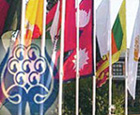
As the 15th South Asian Association for Regional Cooperation (SAARC) gets underway here in Colombo with the participations of eight prominent nations of the region, all eyes are now on India-Pakistan bilateral parley with lots of questions on their strained diplomatic relations. The recent attack on Indian embassy in Kabul (July 07), Afghanistan, and serial blasts in two of the major cities in India have certainly raised doubts over the political standings.
Amid stressful circumstances, Prime Minister Manmohan Singh is scheduled to meet his Pakistan counterpart Yousuf Raza Gilani on Saturday (August 02), where he will take up the issue of terrorism in his agenda with precedence. Both leaders have a taxing time ahead as India has already indicated the alleged hands of Pakistan’s Inter-Service Intelligence (ISI) for the attack on its embassy in Kabul.
While Islamabad has been incessantly denying such allegation, the United States administrative official’s statement to the New York Times citing ISI’s hand on Kabul attack and in instigating violence in Afghanistan by helping Taliban rebels is a worrying factor for Pakistan. Prime Minister Gilani has asked the ISI official to report to PM’s office to all matters concern since then. But whether the Pak democratic government will be able to take control of ISI activity is still a question.
To all knowledge, ISI was never in control of Pakistan’s politicians but only acted in direction of the Army Chief. So, Prime Minister Gilani has a lot to assure in regards to his country’s commitment to fight against terrorism keeping in vision that Pakistan is itself now a victim of terror.
The other important issue that is to be taken up by India is the increasing infiltration along the Line of Control (LoC) and also the repeated violation of ceasefire by Pakistan army. No doubt, terrorism will remain be the prime subject of discussion among the members of SAARC nations.
With this, India’s demand for a mutual legal assistance treaty for criminal matters is likely to be tabled for effectively dealing the menace. The Summit will try to figure out the possibilities of an agreement for mutual legal cooperation. In the last SAARC summit, it could not take shape due to Pakistan’s opposition to the extradition clause.
As terrorism is a global threat, there needs to be some common understanding and a framework which is significant for the overall development of the region. India maintains its stand and other members especially Pakistan has to come out with a solid approach for the Summit to be successful.
|
|
Read More: South Goa


Comments: